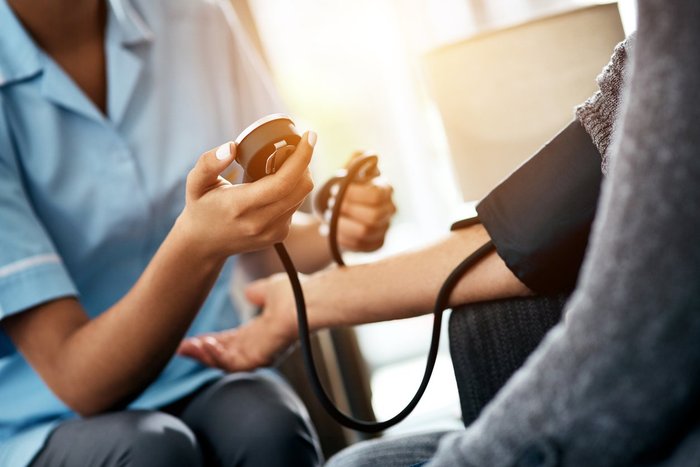More than one in two people with CKD have high blood pressure and there’s a two-way relationship between them. High blood pressure can cause CKD in the first place, and CKD can in turn raise your blood pressure more – but fortunately there are lots of ways to manage your blood pressure and lower your chances of CKD.
What is high blood pressure?
Blood pressure is the term doctors use to describe the force of the blood pushing against the walls of your blood vessels as the heart pumps it out.
When you have high blood pressure (doctors may call it hypertension), it means blood’s putting a lot of pressure on your blood vessel walls. Your arteries should be flexible to cope with your blood pressure going up and down but sometimes they can become stiff or narrow, so blood has to be pushed through them more forcefully, resulting in consistently high blood pressure.
Doctors measure blood pressure in millimetres of mercury (mmHg) and record it with two numbers:
- the systolic pressure – the higher number – is the force at which your heart is pumping out blood.
- the diastolic pressure – the lower number – shows your blood vessels’ resistance to the blood flow.
Generally, doctors like your blood pressure to be somewhere between 110/70mmHg and 120/80mmHg. High blood pressure is 140/90mmHg or above.
Everyone’s a bit different so your GP can tell you what you should be aiming for.
If you have CKD and/or diabetes, your doctor may want you to keep your blood pressure below 130/80.
How does high blood pressure damage your kidneys?
- Over time, high blood pressure can damage blood vessels throughout your body, which can affect the blood supply to organs including your kidneys
- high blood pressure also damages the delicate filtering units in your kidneys
- this can affect the way your kidneys get rid of waste and extra fluid
- the extra fluid builds up in your body and pushes your blood pressure up even higher
- higher blood pressure makes it more likely your kidney disease will get worse, which can lead to heart problems too.
As many as 5 million UK adults have undiagnosed high blood pressure
Monitoring your blood pressure
The first important step is to figure out whether your blood pressure’s high. That’s easy to do with a blood pressure cuff – you can use one at home or see your GP, practice nurse or pharmacist for a regular check.
A one-off high reading is usually nothing to worry about but if it’s consistently high, you should speak to your GP about ways to lower it.
Keeping your blood pressure healthy
Making some simple tweaks to your lifestyle can reduce your chances of high blood pressure and CKD, and can help lower your blood pressure if it’s already too high. The key changes to make include:
- reducing your salt intake
- having a healthy, balanced diet with lots of fruit, vegetables and whole grains
- losing weight if you need to
- staying active most days of the week
- not smoking
- reducing caffeine
- managing stress
- drinking alcohol in moderation only – no more than 14 units a week.
If you already have high blood pressure
Everyone who has high blood pressure is at risk of developing CKD, so talk to your doctor about having tests to check for early signs of kidney damage, including:
- A blood test to work out your blood creatinine level, and something called ‘glomerular filtration rate’ (GFR), which measures your level of kidney function. Creatinine should be as low as possible, and GFR as high as possible
- A urine test to check for protein and red and white blood cells, which can indicate kidney damage.
If you’re diagnosed with high blood pressure, it’s really important you take steps to lower it.
The lifestyle changes above will help slow or prevent CKD due to high blood pressure and you might also be prescribed medicines to get you to your target blood pressure, such as ACE inhibitors, ARBs, diuretics and beta blockers.
If you have diabetes and CKD you may be given an ACE inhibitor or ARB even if your blood pressure’s below 130/80, as these medicines can protect kidney function.
Treating CKD and high blood pressure
If you’re diagnosed with both high blood pressure and CKD, your healthcare team will come up with a treatment plan that aims to:
- keep your blood pressure below 130/80
- stop kidney disease getting worse
- reduce your chances of heart disease.
Your plan will usually involve lifestyle changes and medicines. Depending on your CKD stage, your healthcare team might recommend you follow a special diet to help manage blood pressure and CKD.
AstraZeneca has contributed to the funding of this material as part of a Patient Advocacy Group Partnership between Kidney Care UK and AstraZeneca UK Limited. AstraZeneca has had no editorial input into or control over the content which has been independently owned and created by Kidney Care UK.
